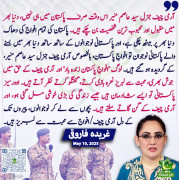You are right about what you said. But what i stated is also correct in the real world. There are plethora of examples where some ones competency was the factor over a merit.
if you look at current scenario. Khattak is the best possible candidate for KPK, IK can put murad as CM , but it wont be a good decision. whereas , he left Fauzia Kasuri in favor of Shireen Mazari. In my opinion both are very good decisions. Both people can bear the burden on their own shoulders, whereas Murand & FK are still novice.
This clearly shows both merit & competency.



























